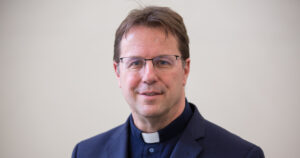Richard Carter in his book ‘In Search for the Lost’ includes these extracts from his correspondence with Charles Montgomery about ‘miracles of love’, where he writes about faith stories – some of which mean more to one person that to another. Richard Carter sees that a true revelation of God’s love inevitably has to lead us the same way that it led Christ – a way that leads us to humility, to a sense that we are part of God’s mystery rather than creating out own. In this way signs and stories of faith are in the end redemptive, leading people free to love rather than imprisoning them in fear or by superstition.
He writes that the martyred Brothers showed people what it means to be of God – pointing beyond themselves to a better way, to God’s way. The danger is always in religion that a practice becomes cultish or the symbol becomes itself an idol rather than looking beyond toward God. This is not freeing but rather a narrowing. ‘People love to create such idols for they become ways of controlling our own destiny, creating our own controllable gods’.
‘As C. S. Lewis said, prayer should not be about how we change God but letting God change us. The humbling effect of our seven Brothers’ deaths has been very profound. It allows for a true Christology to emerge, A Christology that has always been there but is not always what people either want to hear or want for themselves. The incarnation was about healing and forgiveness and life in all its fullness, but it was never about the manipulation of people and events for personal power. Christ never offered an escape or divine immunity. In fact quite the opposite he said they must carry the cross and pass through pain and suffering …’
Charles Montgomery asks Richard Carter why he had teased him about his search for proof of supernatural power, and Richard responds that you cannot be detached from faith or analyse it the way a scientist tests the purity of the water – rather you have to swim in it and then try and make sense of the experience you have. The temptation for Charles is that he is lured out of the water by the society he lives in to get back on the bank and abandon the discovery that those on the bank perhaps have never had.
When asked about the forces of good and evil Richard Carter comments on the sense of evil evoked by the war against Iraq when he felt the most profound experience of darkness exacerbated by the UK’s participation and the part played as the perpetrator of evil.
‘Evil has a power and momentum of its own which sucks others, often innocent, into its whirlpool. But God’s love has an even greater power for it cannot be defeated. Even the cyclone can take us to the top of the mountain where we stand in the brilliance of the light. St Paul says that sin flows, but that grace overflows.’ 
Richard Carter – now at St Martin’s in the Field, London